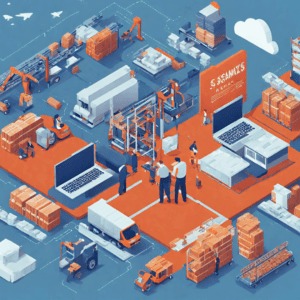In the face of complex challenges within supply chain operations, such as demand forecasting, production planning, and risk management, business leaders often encounter difficulties. Traditional approaches sometimes lack the agility to adapt to sudden changes, resulting in operational inefficiencies, escalated costs, and diminished customer satisfaction.
Adopting Generative AI in supply chain management not only propels operational efficiency to new heights but also fortifies business resilience, trims down expenses, and encourages eco-friendly practices. This strategic move empowers organizations to flourish in an ever-evolving business landscape.

Key Benefits of AI in Supply Chain Management
Enhanced Planning and Accurate Forecasting
Generative AI revolutionizes supply chain management by simplifying complex interactions and generating real-time demand models. This innovation ensures that inventory levels, production schedules, and distribution strategies are meticulously aligned with fluctuating customer demands and prevailing market trends, setting a new standard for planning and forecasting accuracy.
Boosted Production Efficiency
AI-driven approaches to production planning take into account a myriad of variables such as customer demand variations, production capacity, resource availability, and order prioritization. This holistic view enables businesses to alleviate bottlenecks, optimize the allocation of resources, and significantly improve production efficiency.
Proactive Risk Management and Increased Resilience
Generative AI tools possess the remarkable ability to foresee and manage potential supply chain risks. By simulating various scenarios and proposing multiple action plans in the face of disruptions, these tools substantially enhance a company’s risk management capabilities, thereby increasing its resilience against unforeseen challenges.
Cost Reduction and Promotion of Sustainability
The integration of AI into supply chain processes leads to a notable reduction in operational costs, optimized resource usage, minimized waste, and the promotion of sustainable practices. Ultimately, these advancements contribute to a more sustainable cost structure and bolster the long-term resilience of businesses.
In summary, leveraging AI in supply chain management not only addresses current operational challenges but also sets the stage for future growth and sustainability. This technology-driven approach ensures that businesses remain competitive and responsive in a dynamically changing global market.
Next Brain’s Applications in Supply Chain Optimization:
Demand Forecasting:
Analyzing sales data and market trends for real-time demand models, enabling efficient inventory, production, and distribution planning.
Production Planning:
Facilitating production scheduling by considering factors like customer demands, capacities, and resource availability.
Risk Management:
Identifying supply chain risks through analysis of historical data, market conditions, and external factors.

 +34 910 054 348
+34 910 054 348 +44 (0) 7903 493 317
+44 (0) 7903 493 317